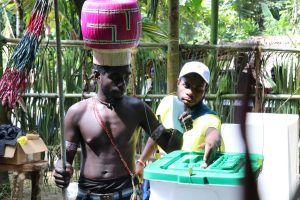Preparations and campaigning for the presidential election in Papua New Guinea’s Autonomous Region of Bougainville have restarted. The election was delayed by two months due to the COVID-19 pandemic, and will now take place over a three week period from August 12 to September 1, with a result expected by mid-September.
Like the independence referendum that took place late last year, this long voting period is designed to allow people who live in remote locations every opportunity to be able to participate. Many villages are only accessible by helicopter, making the election an incredibly difficult logistical exercise for Bougainville’s electoral commission. The referendum was incredibly successful in gaining widespread participation and the expectation will be for the presidential election to be just as successful.
This will be the fifth presidential election to take place since 2005, after Bougainville was afforded significant autonomy in a peace agreement signed in 2000, following a decade-long civil war in PNG. The vote looks set to be a highly complex affair, with 25 candidates on the ballot, and currently no clear favorite. The outgoing president, John Momis, has served his constitutionally bound two terms. Momis attempted to challenge this provision in the constitution; however, his appeal was rejected by the PNG Supreme Court.
The result of the election will be vitally important not just to Bougainville and PNG, but the wider Melanesian and Pacific regions, as the newly elected president will be responsible for negotiations with Port Moresby to establish a independent state. The referendum held late last year produced an overwhelming result in favor of Bougainville independence, with 98 percent of people voting for the proposition amid 87 percent turnout.
The referendum result is nonbinding, and instead designed to instigate a period of consultations and negotiations between the Bougainville and PNG governments. However, the huge showing in favor of independence will provide the new president with considerable leverage in these negotiations, and place PNG Prime Minister James Marape in an incredibly difficult position.
For Marape, honoring the result of the referendum has the potential to destabilize other parts of PNG. New Ireland, Enga, and East New Britain are all seeking greater autonomy from the central government. Marape will also need to factor in PNG’s relationship with Indonesia, as an independent Bougainville could create greater momentum for West Papua’s independence push. Jakarta would also fear the creation of a new Melansian state that would be sympathetic to — and willing to advocate for — West Papua’s cause.
Alongside seeking to establish the world’s newest country, the victor of the election will also need to put in place the necessary components to make the country viable. Although the autonomy that Bougainville was granted by the peace agreement has enabled the government to develop some of the required infrastructure to transition toward full sovereignty, at present Bougainville’s government derives only 14 percent of its budget from internal revenue generation, making it heavily reliant on aid transfers from the PNG government and foreign aid.
This will make the fate of the Panguna copper mine a central focus of the election campaign. Conflict over the mine ignited the civil war throughout the 1990s. At one stage the mine was responsible for 40 percent of PNG’s foreign currency revenue, but the people of Bougainville saw little benefit from that enormous wealth. It has been estimated that the Panguna mine retains around $58 billion worth of copper and gold, making the reopening of the mine an almost irresistible prospect for the revenue-starved Bougainville government, which will be looking to establish itself as a new state.
Former President James Tanis, who is again a candidate in the upcoming election, has made it known that the reopening of the mine cannot be rushed. It needs to be approached in a way that takes both the community benefits and the environmental impacts into consideration. The emotional impacts of the civil war that killed up to 20,000 people also remain sensitive and will require deft handling alongside any attempt to reopen the mine.
The Bougainville presidential election has a number of moving parts that if not approached carefully have the potential to once again destabilize the island, and the wider Melanesian region. Primarily, the new president will have to be able to form an effective working partnership with the PNG prime minister, as without this durable progress toward respecting the result of last year’s referendum will be very difficult.
Whoever makes it through the crowded field to win the election will have a considerable responsibility resting on their shoulders.

































